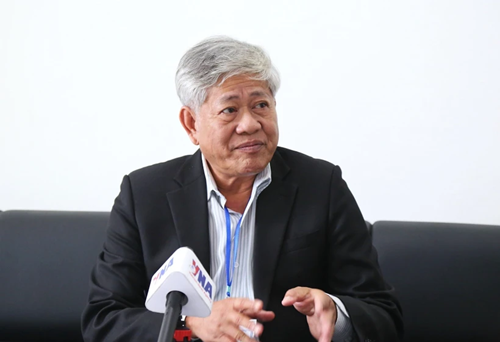The formation of the CPV in 1930 marked a watershed moment in the Indochina history, emerging during a period of profound colonial upheaval. The Party's establishment opened a new chapter in Vietnam's revolutionary history, initiating a process that led to the struggle for national independence and liberation, and the path towards socialism, he explained.
    |
 |
|
Minister Delegate attached to the Cambodian Prime Minister and head of the historical research committee of the Cambodian People’s Party Keo Baphnom |
In the context that Vietnam and the Indochina as a whole were under the French colonial rule, the Party’s first political platform identified Vietnam’s core revolutionary path, meeting the essential requirements of the history as well as becoming a rallying point for revolutionary forces, unifying various communist organizations and revolutionary forces and the whole nation.
The historical significance of the Party extended beyond Vietnam’s borders, inspiring liberation movements throughout colonial territories, particularly in Cambodia and Laos, he said, adding the Dien Bien Phu Victory in 1954 under the leadership of President Ho Chi Minh forced France to recognize the independence of all the three Indochinese countries and marked the end of war in the region.
Reflecting on the CPV's role in modern Vietnam, Baphnom laid stress on the milestone of Doi moi (renewal) initiated in 1986 amidst international turbulence, including the serious crisis of the socialist systems in the Soviet Union and Eastern Europe. The CPV upheld its ideological foundation of Marxism – Leninism and Ho Chi Minh thoughts, seeing them as the lodestar to deliver on its consistent goal of building a democratic and prosperous nation towards socialism.
Baphnom underscored that the unwavering commitment to the socialist path, along with its ideological goals and substantive values is the most crucial factor enabling the CPV to maintain its revolutionary leadership role. He noted that history demonstrated how Vietnam's revolutionary victories over the past 95 years have stemmed from the Party's steadfast determination and the Vietnamese people's strength, aspirations and faith in socialism - the inevitable path of the revolution.
Thanks to its Doi Moi policy, Vietnam, from a poor and isolated nation, has emerged as a middle-income country that is deeply integrating into the global community, with GDP reaching 476 billion USD in 2024 making it ASEAN's fifth-largest economy, and per capita income up 20-fold to 4,700 USD.
Vietnam has maintained diplomatic relations with 194 countries and territories, and strategic and comprehensive partnerships with 30 countries, including all permanent U.N. Security Council members and G7 nations.
He expressed his confidence that under the Party’s astute leadership and a foreign policy of independence, self-reliance, peace, cooperation and development, multilateralization, and diversification of external relations, the Vietnamese people are well-positioned to enter a new era – that of the nation’s rise, pursuing the goal of building a prosperous, strong, democratic, fair, and civilized nation and obtaining a developed status by mid-21st century.
Source: VNA